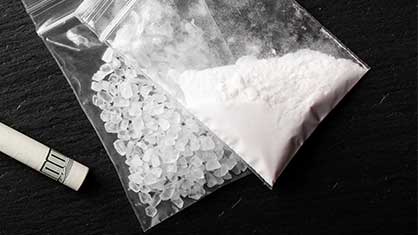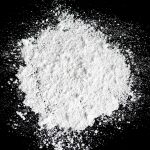Cocaine and methamphetamine are two of the most dangerous substances in the world. Both are considered stimulant drugs. That means they speed up your central nervous system, causing a rush of energy, confidence, and euphoria (intense joy).
While the drugs are similar in many ways, they also have some important differences.
What’s The Difference Between Cocaine & Meth?
Cocaine is a white powder that can be snorted or injected. Some people also use the powder to make a rock-like substance called crack cocaine, which is smoked in a pipe. Although cocaine is illegal in most cases, it’s sometimes used as an anesthetic before surgery.
Methamphetamine (or “meth”) is a colorless or white powder that can be snorted, injected, or eaten. It can also be pressed into pills or cooked into a rock-like substance called crystal meth. Like crack cocaine, crystal meth is smoked in a pipe.
While meth is generally illegal, it’s sometimes prescribed in pill form to treat attention-deficit/hyperactivity disorder (ADHD) and obesity.
Despite their similarities, cocaine and meth differ in terms of production, strength, and effects.
Differences In Production
Cocaine is made from the leaves of the coca plant, which is native to South America. That means it’s a plant-based drug.
Meth, on the other hand, is a synthetic drug made from a variety of chemicals. Its main ingredients are pseudoephedrine and ephedrine. These substances act as decongestants and appear in numerous cold medications.
Drug traffickers make pseudoephedrine and ephedrine into meth by adding powerful ingredients such as:
- acetone
- anhydrous ammonia
- battery acid
- ether
- iodine crystals
- lithium
- red phosphorus
Differences In Strength
Both cocaine and meth boost the effects of dopamine in your brain. Dopamine is a neurotransmitter (brain chemical) associated with pleasure, motivation, and reward.
According to animal studies, meth causes much higher levels of dopamine than cocaine. That’s because meth not only blocks the reabsorption of dopamine by your brain cells but also increases the release of dopamine in your brain.
In contrast, cocaine only blocks dopamine’s reabsorption. This is why meth is generally considered stronger than cocaine.
Differences In Effects
Both cocaine and meth have short-term and long-term effects. Many of these effects are similar, including:
- increased energy and alertness
- increased talkativeness
- reduced appetite
- increased sex drive
- anxiety
- panic
- irritability
- aggression
- psychosis (a temporary loss of connection with reality characterized by hallucinations, paranoia, and delusions)
- shaking
- muscle twitches
- increased heart rate, blood pressure, and body temperature
- seizure
- stroke
- heart attack
While the drugs may have similar effects, meth stays in the body much longer than cocaine. In general, the effects of meth last up to 12 hours, while the effects of cocaine only last up to 2 hours.
In addition, meth can also cause unique effects, including “meth mites” and “meth mouth.”
The term meth mites refers to the sensation of bugs crawling on or under the skin. It often leads to intense scratching that leaves sores and scabs. The term meth mouth refers to the dental problems associated with meth use, such as severe tooth decay and rotting gums.
Cocaine Addiction Vs. Meth Addiction
Both cocaine and meth are extremely addictive. Addiction is a serious disease that makes you feel unable to stop using a drug. It occurs when your brain gets used to the excess amounts of dopamine caused by drug use.
Your brain then produces less dopamine naturally, which makes it difficult to feel pleasure from activities that don’t involve drugs.
Both meth addiction and cocaine addiction have similar symptoms, including:
- intense drug cravings
- loss of interest in activities once enjoyed
- loss of motivation
- mood swings
- tolerance (needing increasingly larger or more frequent doses of a drug to feel the desired effects)
- physical dependence (experiencing unpleasant withdrawal symptoms when you stop using a drug)
Cocaine and meth can cause different withdrawal symptoms. The most common cocaine withdrawal symptoms include:
- mood swings
- aches and pains
- irritability
- trouble sleeping
- nausea
The most common meth withdrawal symptoms include:
- restlessness
- depression
- fatigue
- increased appetite
- nightmares
Is Meth More Addictive Than Cocaine?
Because it’s so powerful, meth is often considered the most addictive stimulant drug. However, some people may find cocaine more addictive than meth. It depends on the person.
Treatment Options For Cocaine & Meth Addiction
Both cocaine addiction and meth addiction require treatment. If you or a loved one is struggling with one or both of these drugs, seek help at a substance abuse treatment program. Available on an inpatient or outpatient basis, these programs offer interventions such as:
- medical detox, which can help you reduce or avoid withdrawal symptoms as you become drug-free
- cognitive behavioral therapy, which can help you manage drug cravings and any underlying mental health disorders that may have contributed to your meth or cocaine use
- support groups, which can connect you with other people recovering from addiction and help you feel less alone
To learn more about addiction treatment options, please reach out to Northeast Addictions Treatment Center. Our board-certified health care providers offer personalized, comprehensive care to help you stay healthy and sober.
Keep Reading:
Sources:
National Institute on Drug Abuse — How is methamphetamine manufactured?
National Institute on Drug Abuse — What are the immediate (short-term) effects of methamphetamine misuse?
National Institute on Drug Abuse — What are the short-term effects of cocaine use?
National Library of Medicine: MedlinePlus — Cocaine
National Library of Medicine: MedlinePlus — Methamphetamine











